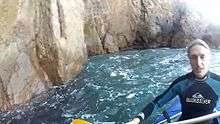Deep-water soloing
| Part of a series on |
| Climbing |
|---|
 The Psicobloc at Cala Varques (Majorca) |
| Background |
| Types |
| Lists |
| Terms |
| Gear |
| Climbing companies |
|

Deep-water soloing (DWS), also known as psicobloc,[1] is a form of solo rock climbing, practiced on sea cliffs at high tide (originally, but also on reservoirs, rivers,[2] swimming pools -indoor-,[3] ...), that relies solely upon the presence of water at the base of a climb to protect against injury from fallings from the generally high difficulty routes.[4] Although this is viewed as a relatively new style of climbing, it originated in the 1970s. Real development of the style began in the mid-late 1990s, and is progressing to this day.
Normally a dinghy is used to pick up the fallen climber as a fall from a taller route can still knock him/her out, causing them to drown.
This type of climbing is most notably practiced on the coasts of Dorset, Devon and Majorca, but also in the Calanques near Marseille, around the Southern Pembrokeshire coast, parts of Ireland, Sardinia,[5] Spain, Greece, the lakes of Central Texas, and many other climbing areas.
The practice of Deep-water Soloing in Majorca has its roots in the late 1970s. In 1978, Miquel Riera became frustrated with the aid climbing routes in his local area, so he went to Porto Pi, Palma with his friends Jaume Payeras, Eduardo Moreno and Pau Bover in order to find routes that they could free climb. This became Majorca's first bouldering venue, and as time went Riera progressed onto the short sea cliffs near there. It was named "Psicobloc", which, when translated literally into English, means "Psycho Bouldering". During the 1980s psicobloc was overshadowed by sport climbing, which was growing greatly in popularity, but this did not stop Riera from continuing his obsession, as he put up many new routes and published articles in the Spanish climbing press.[6]
Tyulenovo and Kamen Bryag are places for Deep Water Soloing in Bulgaria that recently gained popularity among the local climbing society and surrounding countries in Eastern Europe. They provide enough material to keep even the real professionals interested for a week. The routes range from 5 to 20 meters and from 5a to 8a. There is also a boulder section.
Gibraltar has excellent Deep water soloing on Jurassic limestone. The routes are generally steep and interspersed with good traverse sections and large caves. The routes range from 3 meters to 20 meters. All the routes can be easily accessed via the cliff top.
See also
References
- ↑ "DWS World". Retrieved March 25, 2011.
- ↑ Psicobloc (MyEtymology.com)
- ↑ II Open Internacional de Psicobloc Ciutat de Barcelona (Bi Zaes)
- ↑ "UKClimbing - So You Want to Go Deep Water Soloing?". Retrieved March 25, 2011.
- ↑ "Article on psicobloc in Desnivel magazine".
- ↑ Beail, Damon. "A History of Mallorca Deep Water Soloing". Retrieved 19 June 2012.